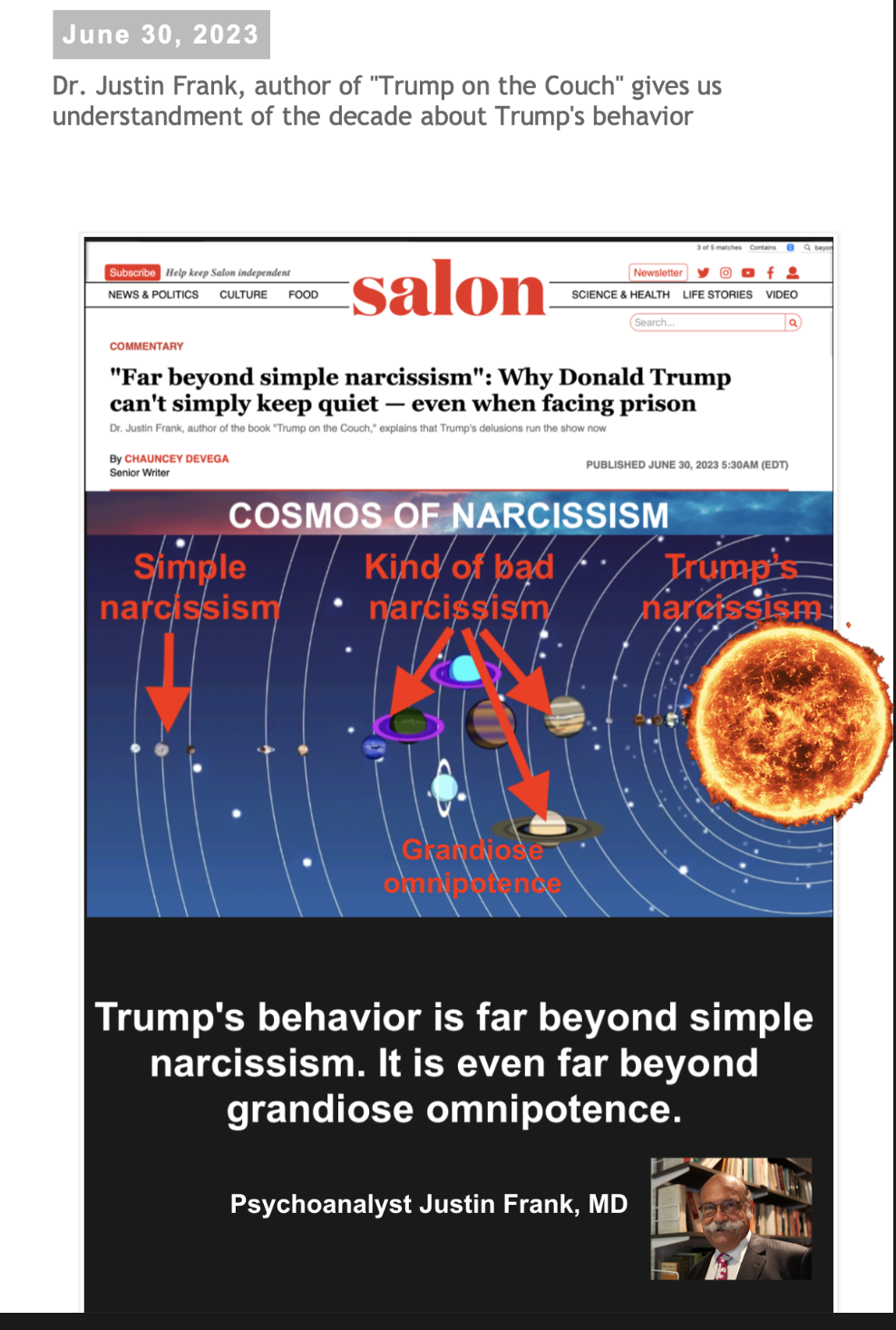By Hal Brown, MSW, psychotherapist and mental health center director retired after 40 years of clinical practice.Yesterday I praised Chauncey DeVaga for his Salon column which featured the opinions of two esteemed psychoanalysts, Justin Frank and Lance Dodes, both of whom have warned of the dangers of Trump's psychopathology for years.
If you missed the blog you can read it here: Dr. Justin Frank, author of "Trump on the Couch" gives us understatement of the decade about Trump's behavior.
I am on the email list for NeuroscienceNew.com and by coincidence was sent the article The Language of Lies: How Hate Speech Engages Our Neural Wiring to Foster Division which I found presented another perspective on what I wrote about yesterday.
The article describes the research described In the book "Politics, Lies and Conspiracy Theories, just released, by Marcel Danesi Ph.D., a professor of semiotics and linguistic anthropology at the University of Toronto, Canada. He analyzes the speeches of dictators including Mussolini, Stalin, Putin and Hitler, as well as prominent hate groups.
Here's the summary:
Researchers analyze the language of dictators and hate groups, uncovering a common use of dehumanizing metaphors to fuel hatred. Such metaphors ‘switch on’ neural pathways in the brain, bypassing higher cognitive reasoning centers and steering focus towards certain ideas.
These mental patterns can become entrenched over time, making it challenging for individuals to revise their views even in the face of contradicting evidence.
The research underscores the potential dangers posed by such language, including the escalation of violence and political instability.
Danesi's research shows that such dehumanizing metaphors are powerful "because they tap into and ‘switch on’ existing circuits in the brain that link together important and salient images and ideas. In effect, metaphors bypass higher cognitive reasoning centers, directing our thoughts to focus on certain things whilst ignoring others."
He observes that the more these brain circuits are activated the more hardwired they become. Eventually they.becomes almost impossible to turn off. This can be see with those who believe conspiracy theories. The more the therapies are reinforced the more difficult it becomes to lead these people to rethink their basis of their beliefs and realize they are wrong.
The conclusion is far from optimistic:
What can be done?
Is there anything we can do to protect ourselves from the power of lies? According to Danesi, the best thing we can do is to understand the metaphors of the other party, and to examine one’s own metaphors.
However, history and science tells us that it is unlikely to work – research shows that once a lie is accepted as believable, the brain becomes more susceptible to subsequent lying.
Those mental health professionals who are attempting to understand the entrenched and erroneous belief systems of Trump and his hard-core supporters tend to lean toward those who employ an understanding of the way the mind functions based of Freudian, or psychoanalytic theory (the reason for my photo of Freud's couch above).
I count myself among these mental health practitioners who have been trained in psychoanalytical personality theory and either psychoanalysis for them and psychodynamic psychotherapy for me.
A highly regarded expert explaining the behavior and beliefs of Trump and his cult is Bobby Azarian, PhD. He comes from the world of cognitive neuroscience. Unlike Justin Frank, Lance Dodes, John Gartner, Bandy Lee, and far less prominent mental health professionals like me, who have written about Trump's psychology from a psychodynamic perspective, Azarian writes from what I might call simplistically a brain perspective. Another way to put colloquially it is that he writes about the hard wiring of the brain.
Chauncey DeVega interviewed Bobby Azarian in 2019 here:
"The effects of fear and anger [on the brain]" may make us even more polarized, says neuroscientist Bobby Azarian
His "Psychology Today" articles related to Trump and his followers have titles and subtitles like these:
There's a glitch on the link to his articles, here, so it is temporarily unavailable. Hopefully this will be repaired before long. You can get an idea of what he writes about from the titles and subtitles of his most recent articles related to Trump and his cult.
Bogus conspiracy theories will undoubtedly play a major role in the upcoming presidential election. The question is whether anything can be done about it.
Is the nation's collective narcissism the reason for Trump's popularity and political invincibility? A study suggests a causal link between the phenomena.
This brain quirk makes gaslighting particularly easy.
Research suggests that the president is more intuitive than analytical.
Was Donald Trump sent by God to save America? Some believe so, and that should have us worried.
President Trump’s divisive rhetoric can warp a person’s mind into believing that domestic terrorism is justifiable.
Baffled by Donald Trump's political invincibility? Here are 14 reasons why people continue to support the president despite behavior that would have sunk any other politician.
The president's backers share some consistent and troubling characteristics.
My point is sharing the Neuroscience News article and referencing Bobby Azarian's insights is to emphasize how complex addressing the underlying problem of how, if not insurmountable a task it is, how massive an endeavor it is to alter these deeply held beliefs.
Addendum: There's yet a third aspect to understanding Trump and those in power like him, and the hold they have on their supporters. George Lahoff, retired Distinguished Professor of Cognitive Science and Linguistics at the University of California at Berkeley and now Director of the Center for the Neural Mind & Society has written frequently about this subject and Trump in particular. He was writing about his take on "Understanding Trump" (read essay here) as early as 2016. His focus in on the often incredible power cultural metaphors have on people.
It is vitally important to grasp how psychodynamics, the wiring of the brain, and ingrained cultural metaphors among certain groups not only influence but shape belief systems and resulting behaviors. These phenomena are interrelated but also must be understood in their own right to gain a complete grasp of why people think and act the way they do for the betterment of society and their own selfish needs to the detriment of society as a whole.














